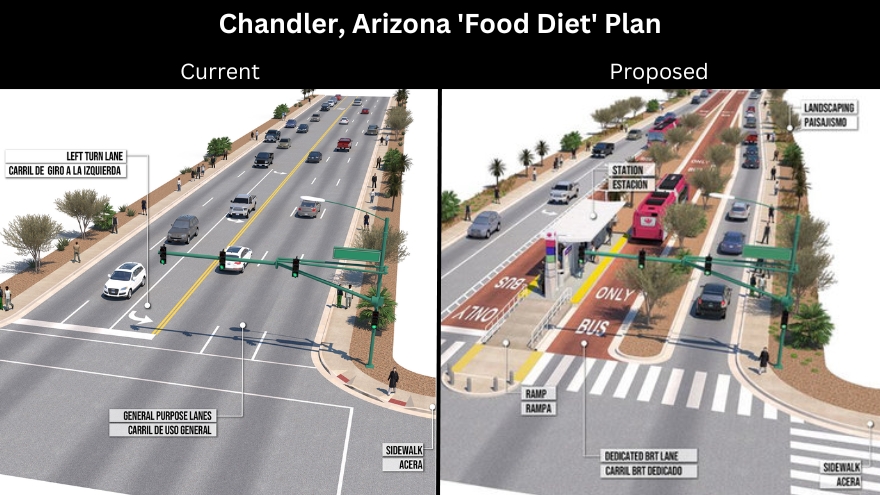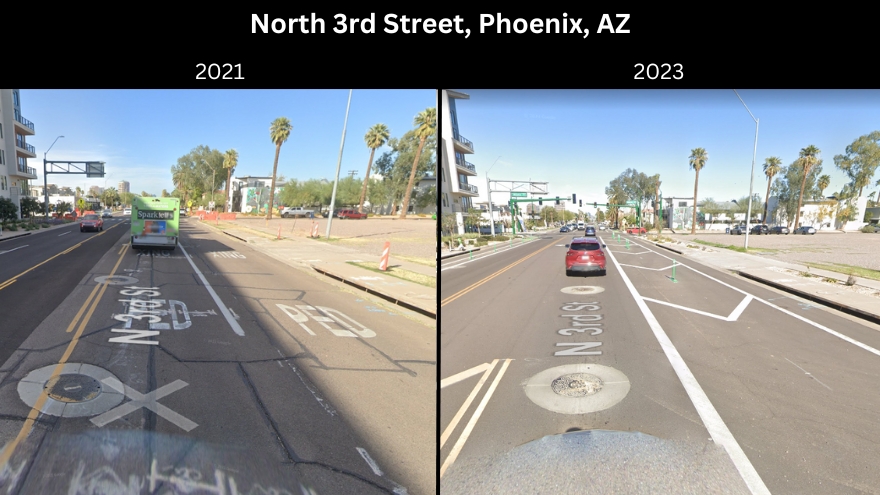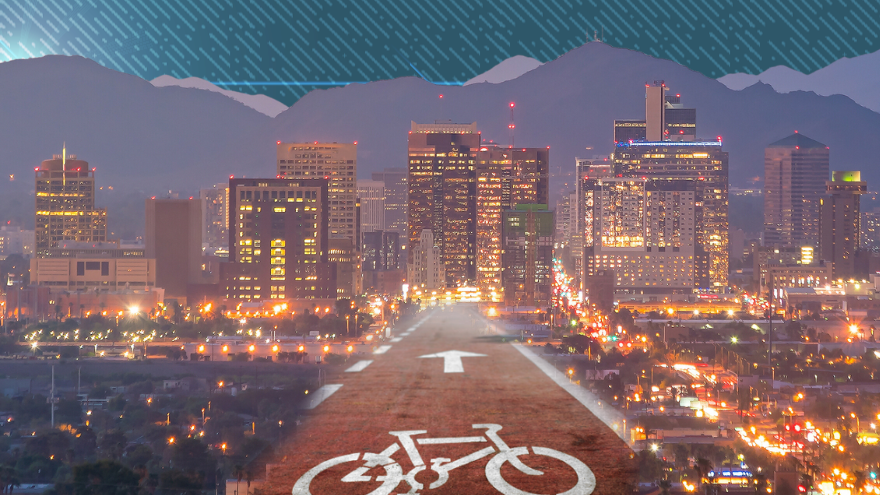Phoenix, Ariz.—With little public attention or fanfare, officials in Arizona are advancing an agenda to move the city closer into alignment with sustainability goals similar to those of globalist organizations like the World Economic Forum and United Nations.
In the suburb of Chandler, roughly 20 minutes south of Phoenix Sky Harbor International Airport, officials are holding a hearing on whether to implement a regional transportation plan by the county to create road diets, which will severely restrict lanes available to motorized vehicles.
The Maricopa County Associate of Governments plan, MOMENTUM, would rip up Arizona Avenue in a massive two- to three-year construction project that aims to reduce vehicle lanes and foot traffic to local businesses.
Chandler’s City Council has scheduled the meeting for 6 p.m. on May 25, at 88 E. Chicago St. in the council’s chambers, so that members of the public can support or oppose the project.
Road diets take city streets that have two or more lanes and redesign them to have fewer lanes (usually just a single lane) for motorized vehicles, while converting the extra road space to bicycle lanes or lanes for mass transportation (i.e., buses, light-railways).
Cities have implemented road diets for decades, but there has been a recent push to expand them as concern has exploded among public officials who believe the world will soon end because of rising earth temperatures.
Arizona’s plan, as stated on the official website, “funds non-motorized transportation infrastructure and continues our investments in alternative modes like ridesharing and [public] transit” to help the region “do its part in curbing climate change.”
Earlier this year, urban designer Alexandros Washburn discussed how cities need to “reimagine” their relationship with nature, urging planners to go on road diets to “find ways of moving that don’t emit carbon.”
Aside from any purported long-term benefits of road diets, the short term tradeoffs could be catastrophic for local communities.
Merissa Hamiltion — a Phoenix resident, former elected official and grassroots community organizer — says that if Chandler’s road diet plan proceeds, it will devastate the local business community.
“This will permanently close many of our small businesses,” Hamilton said in a video posted to Twitter.
I am back in Chandler today reaching out to local businesses and letting them know that MAG plans to come and rip up their beautiful road with a 2-3 yr bus rapid transit project that will permanently reduce their foot traffic
We need your help to save our local businesses pic.twitter.com/pWcvSPcJfb
— Merissa Hamilton 🗳 ⛽ 🗽🔥 (@merissahamilton) May 24, 2023
“Chandler’s just such a beautiful area. We need to preserve the small businesses here, preserve our local businesses. So I need your help,” she said, urging supporters to visit stoproaddiets.com to petition local officials to halt the project.
“There are some calls to action there that you can take,” she told her followers, urging local residents to attend Chandler’s hearing to register public comments.
“Please come out and support our local businesses,” she said. “We gotta save Arizona.”
Chandler’s proposed road diet will take a road with three lanes and squeeze it into a single vehicle lane, with a bike lane and bus lane. This would be the new design for each direction.

The most recent U.S. census data shows that Phoenix is the fastest growing city in the U.S., with the city’s metro area now being home to more than five million people.
Yet, at a time when the city is seeing a historic surge in new residents, multiple neighborhoods in the Phoenix metro area have been implementing road diets by squeezing road traffic down to just a single lane and increasing traffic jams in the process.
City officials recently completed construction of a road diet on 3rd street — a frequently used road with two lanes that were essential for easing the flow of traffic for people leaving work or downtown events.

Traffic has been considerably slowed now that the curb lane is a bike lane and the number of cars traveling has not been reduced.
In Scottsdale, city officials have also moved forward with road diets, effectively creating choke points in areas that are highly trafficked where demand for road space remains unchanged, adding time to driving commutes and frustrating local residents.
Road diets have long been opposed by people concerned that officials are intentionally making it difficult to travel by vehicle to prod the public into alignment with global sustainability goals.
Official statements by elected officials do little to assuage those fears.
“The old model of a car-centric, different-neighborhood-for-every-task city is in many ways slipping through our fingers whether we like it or not,” Eric Garcetti, former Los Angeles Mayor said. “We have to have neighborhoods that are more self-contained. People want to be able to walk or bike or take transit to a movie.”
Garcetti made the comments in reference to the city’s Mobility Plan 2035, which explicitly states that officials seek to “reduce greenhouse gas emissions by promoting more sustainable transportation options,” in order to reduce “the amount of vehicle miles traveled” by gas powered automobiles, and push people into “active transportation choices like biking and walking.”
Though climate change is cited as the need for road diet plans, officials advocating for more restrictive roadway designs have yet to address any data showing the earth is not in severe danger from climate.
Only 12 percent of atmospheric CO2 added since 1750 is manmade, NASA data show no rise in global temperatures over the last decade, and — despite a 1,000 percent increase in industrial-era CO2 emissions — April 2023 was cooler than in April 1985.
In Arizona, officials have multiple other road diets planned for development in Phoenix, Scottsdale, Tempe, Chandler, and Mesa.
Currently, multiple hearings are scheduled through June 15.
